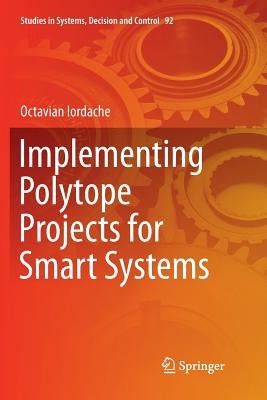
- We will send in 10–14 business days.
- Author: Octavian Iordache
- Publisher: Springer
- ISBN-10: 3319849336
- ISBN-13: 9783319849331
- Format: 15.6 x 23.4 x 1.1 cm, minkšti viršeliai
- Language: English
- SAVE -10% with code: EXTRA
Implementing Polytope Projects for Smart Systems (e-book) (used book) | bookbook.eu
Reviews
Description
This book presents a domain of extreme industrial and scientific interest: the study of smart systems and structures. It presents polytope projects as comprehensive physical and cognitive architectures that support the investigation, fabrication and implementation of smart systems and structures. These systems feature multifunctional components that can perform sensing, control, and actuation.
In light of the fact that devices, tools, methodologies and organizations based on electronics and information technology for automation, specific to the third industrial revolution, are increasingly reaching their limits, it is essential that smart systems be implemented in industry. Polytope projects facilitate the utilization of smart systems and structures as key elements of the fourth industrial revolution.
The book begins by presenting polytope projects as a reference architecture for cyber-physical systems and smart systems, before addressing industrial process synthesis in Chapter 2. Flow-sheet trees, cyclic separations and smart configurations for multi-component separations are discussed here. In turn, Chapter 3 highlights periodic features for drug delivery systems and networks of chemical reactions, while Chapter 4 applies conditioned random walks to polymers and smart materials structures. Chapter 5 examines self-assembly and self-reconfiguration at different scales from molecular to micro systems. Smart devices and technologies are the focus of chapter 6. Modular micro reactor systems and timed automata are examined in selected case studies. Chapter 7 focuses on inferential engineering designs, concept-knowledge, relational concept analysis and model driven architecture, while Chapter 8 puts the spotlight on smart manufacturing, industry 4.0, reference architectures and models for new product development and testing. Lastly, Chapter 9 highlights the polytope projects methodology and the prospects for smart systems and structures.
Focusing on process engineering and mathematical modeling for the fourth industrial revolution, the book offers a unique resource for engineers, scientists and entrepreneurs working in chemical, biochemical, pharmaceutical, materials science or systems chemistry, students in various domains of production and engineering, and applied mathematicians.
EXTRA 10 % discount with code: EXTRA
The promotion ends in 23d.19:08:05
The discount code is valid when purchasing from 10 €. Discounts do not stack.
- Author: Octavian Iordache
- Publisher: Springer
- ISBN-10: 3319849336
- ISBN-13: 9783319849331
- Format: 15.6 x 23.4 x 1.1 cm, minkšti viršeliai
- Language: English English
This book presents a domain of extreme industrial and scientific interest: the study of smart systems and structures. It presents polytope projects as comprehensive physical and cognitive architectures that support the investigation, fabrication and implementation of smart systems and structures. These systems feature multifunctional components that can perform sensing, control, and actuation.
In light of the fact that devices, tools, methodologies and organizations based on electronics and information technology for automation, specific to the third industrial revolution, are increasingly reaching their limits, it is essential that smart systems be implemented in industry. Polytope projects facilitate the utilization of smart systems and structures as key elements of the fourth industrial revolution.
The book begins by presenting polytope projects as a reference architecture for cyber-physical systems and smart systems, before addressing industrial process synthesis in Chapter 2. Flow-sheet trees, cyclic separations and smart configurations for multi-component separations are discussed here. In turn, Chapter 3 highlights periodic features for drug delivery systems and networks of chemical reactions, while Chapter 4 applies conditioned random walks to polymers and smart materials structures. Chapter 5 examines self-assembly and self-reconfiguration at different scales from molecular to micro systems. Smart devices and technologies are the focus of chapter 6. Modular micro reactor systems and timed automata are examined in selected case studies. Chapter 7 focuses on inferential engineering designs, concept-knowledge, relational concept analysis and model driven architecture, while Chapter 8 puts the spotlight on smart manufacturing, industry 4.0, reference architectures and models for new product development and testing. Lastly, Chapter 9 highlights the polytope projects methodology and the prospects for smart systems and structures.
Focusing on process engineering and mathematical modeling for the fourth industrial revolution, the book offers a unique resource for engineers, scientists and entrepreneurs working in chemical, biochemical, pharmaceutical, materials science or systems chemistry, students in various domains of production and engineering, and applied mathematicians.


Reviews